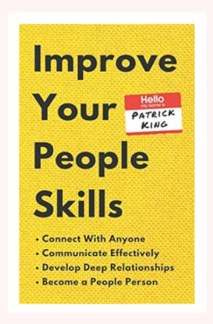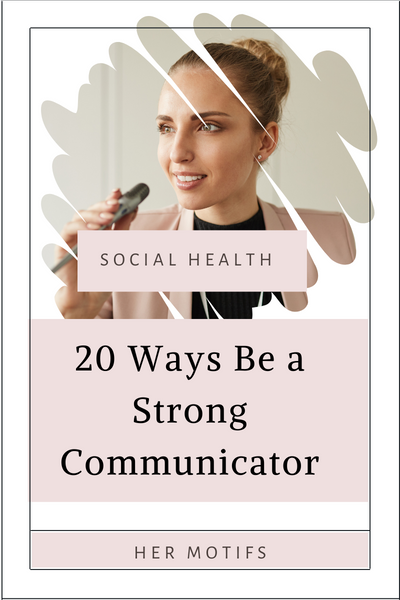20 Ways on How to be a Strong Communicator
 How to be a Strong Communicator is the foundation of all our relationships, personal and professional.
How to be a Strong Communicator is the foundation of all our relationships, personal and professional.
A powerful communicator can convey their message in a clear, concise, and compelling manner.
They can connect with others, build rapport, and influence people with their words. Effective communication is a vital skill that plays a significant role in our personal and professional lives. Whether it’s expressing our thoughts, sharing information, or building relationships, being a strong communicator allows us to connect with others, convey our ideas clearly, and foster meaningful interactions.
It goes beyond just speaking or writing; it involves active listening, understanding non-verbal cues, and adapting our communication style to different situations and audiences. Being a strong communicator enables us to build trust, resolve conflicts, inspire others, and influence positive change. In this blog post, we will explore key strategies and techniques to become a strong communicator, enhancing our ability to connect, engage, and thrive in various aspects of life.
Effective communication is the bedrock of human interaction and achievement. It’s the conduit through which ideas are shared, relationships are forged, and understanding is achieved. Being a strong communicator isn’t merely about having a silver tongue; it’s about cultivating a set of essential skills and practices that foster connection, empathy, and influence. In this comprehensive guide, we will delve into a multitude of strategies and insights on how to become a strong communicator.
.
.
Table of Contents
Tools to Become a Stronger Communicator
From the nuances of verbal and non-verbal communication to the art of active listening and emotional intelligence, these tips will equip you with the tools to enhance your communication prowess. To become a powerful communicator, here are 20 ways and tools to get started:
.
 Master Your Emotions
Master Your Emotions
This book showcases how to best deal, process and release negative emotions It gives you the power to navigate negative emotions.
- Over 100,ooo copies sold
- 31 simple coping strategies
- A formula to reprogram your mind
- How to make your emotions work FOR you.
- A free downloadable workbook, and much, much more!
.
 Master Your Thinking
Master Your Thinking
This book to best deal, process and release negative thoughts
- Why your current thinking is flawed
- 5 common biases that distort your thinking
- 11 powerful questions that will turn you into a super thinker
- The secrets to align yourself with reality and get tangible results
- How to create highly effective strategies that deliver incredible results
.
 Become More Likeable
Become More Likeable
How to Connect With Anyone and Communicate Effectively,
- Develop Deep Relationships, and Become a People
- How to be More Likable and Charismatic
- Become a captivating, comforting, and desired presence
- Build trust, create emotional depth, and cultivate intimacy
- People skills open the doors for your life in a way that literally nothing else can learn the right skills
.
 Power of Storytelling
Power of Storytelling
Win Hearts, Change Minds and Get Results
- The to go authority for ambitious leaders
- Impact your career as much as becoming a masterful storyteller
- Step-by-step instructions for finding, shaping and telling powerful stories
- Practical roadmap to crafting and delivering more powerful, persuasive stories
.
 Personal Development
Personal Development
This book showcases and highlights the best ways to attract people and more importantly develop people skills
- How to change People
- Six ways to make people like you
- How to win people to your way of thinking
- Inspirational personal development guide
- Fundamental techniques in handling people
- Provides an authoritative program for developing the basic and essential people skills
.
.
1. Listen Actively
Listening actively is a skill that can greatly enhance communication and deepen connections with others. When we engage in active listening, we give our full attention to the speaker and seek to understand their message, both verbally and non-verbally. This involves focusing on the speaker’s words, observing their body language, and being fully present in the moment.
Active listening requires setting aside our own thoughts and judgments, suspending the urge to interrupt or formulate a response, and instead, truly hearing what the speaker is saying. By actively listening, we show respect, empathy, and genuine interest in the speaker’s perspective and experiences. It allows for clearer communication, prevents misunderstandings, and fosters trust and mutual understanding.
.
2. Speak Clearly and Concisely
Speaking clearly and concisely is essential for effective communication. When we articulate our thoughts and ideas in a clear manner, we ensure that our message is easily understood by others. Clarity in speech involves enunciating words, using proper pronunciation, and maintaining a steady pace.
By expressing ourselves clearly and concisely, we minimize the risk of miscommunication, confusion, or misunderstanding. We enable others to grasp our points effortlessly and engage in productive conversations and this helps build your confidence.
.
3. Avoid Filler Words
Avoiding filler words is crucial for effective communication and conveying your message with clarity and impact. Filler words such as “um,” “uh,” “like,” and “you know“ can dilute the power of your speech and make you appear less confident or knowledgeable. When we rely on filler words, it can create a sense of uncertainty or hesitation, leading to a loss of credibility.
By consciously eliminating these filler words from our vocabulary, we can express ourselves more fluently and maintain a smoother flow of speech. It requires practicing mindfulness and being aware of our speaking habits. Instead of using filler words, we can take brief pauses to gather our thoughts, allowing us to speak more purposefully and with greater precision.
By choosing our words carefully and avoiding unnecessary fillers, we enhance the clarity and impact of our communication, leaving a stronger and more confident impression on our listeners.
.
4. Use Body Language
Body language plays a significant role in effective communication, as it can convey emotions, intentions, and attitudes without the need for words. When we use body language effectively, we enhance our message and create a stronger connection with others.
Mirroring the body language of the person we are speaking with can help establish rapport and build a sense of trust. Additionally, using hand gestures, facial expressions, and body movements can add emphasis and clarity to our words. For example, leaning forward slightly can demonstrate engagement, while crossing arms might indicate defensiveness. By being mindful of our body language and also improve on your aura.
.
5. Become a Researcher
Researching is a vital component of effective public speaking and you can use your social network. It allows you to gather relevant and reliable information on the topic you are going to address. By conducting thorough research, you can provide accurate and up-to-date facts, statistics, and examples that support your key points.
Additionally, research helps you anticipate potential questions or counterarguments from your audience, allowing you to prepare thoughtful and well-reasoned responses. By investing time in research, you demonstrate a commitment to delivering credible and engaging content to your audience.
.
6. Speak Confidently
Speaking confidently is a powerful skill that can make a significant impact on how we are perceived by others and how our message is received. When we speak with confidence, we exude self-assurance and authority, capturing the attention and respect of our audience. Confidence in speech is reflected in our tone of voice, body language, and the words we choose.
It empowers us to share our ideas, express our opinions, and contribute to meaningful discussions. By cultivating confidence in our speech, we elevate our communication skills and pave the way for success in both personal and professional realms.
.
7. Practice Public Speaking
Practicing public speaking is an invaluable skill that can greatly enhance your confidence, communication abilities, and overall personal development. Public speaking involves delivering a message or presentation to an audience, whether it’s a small group or a large gathering. Your speech can be polite, but not to nice that you cannot express your views. By engaging in regular practice, you can sharpen your speaking skills, overcome stage fright, and become a more effective and engaging speaker.
Through practice, you can gain familiarity with the topic, anticipate potential challenges, and develop the ability to think on your feet. By investing time and effort into practicing public speaking, you can build the confidence and competence needed to communicate effectively and captivate your audience, whether it’s in professional presentations, social settings, or any other public speaking engagement.
.
8. Use Storytelling
Using storytelling is a powerful technique that can elevate your communication skills and captivate your audience. Storytelling has been a fundamental part of human culture for centuries, and it continues to be a compelling way to convey information, evoke emotions, and make a lasting impact.
By crafting narratives that are relevant to the topic at hand, we can effectively communicate complex ideas, convey important messages, and create a deeper connection with our audience. Through the use of vivid descriptions, relatable characters, and compelling plotlines, storytelling adds depth, authenticity, and entertainment value to our communication.
.
9. Ask Open-Ended Questions
Asking open-ended questions is a powerful communication technique that promotes meaningful conversations and deeper engagement. Unlike closed-ended questions that can be answered with a simple “yes” or “no,” open-ended questions encourage individuals to provide thoughtful and detailed responses. .
Open-ended questions often begin with words like “what,” “how,” or “why” and encourage individuals to reflect, think critically, and express themselves freely. These types of questions demonstrate genuine interest, curiosity, and a desire to understand others on a deeper level and understand different mindsets.
.
10. Show Empathy
Showing empathy is a fundamental aspect of effective communication and building strong relationships. Empathy involves understanding and sharing the feelings, experiences, and perspectives of others. When we demonstrate empathy, we acknowledge and validate the emotions of those we interact with, creating a safe and supportive space for open dialogue. .
Empathy allows us to put ourselves in someone else’s shoes, seeing the world from their perspective and fostering a deeper connection. It enables us to offer comfort, support, and encouragement to others, showing them that we care and are there for them.
.
11. Be Aware of Your Tone
Being aware of your tone is crucial in effective communication as it significantly impacts how your message is received and interpreted by others. Your tone encompasses the quality, pitch, and inflection of your voice, as well as the overall attitude and emotions conveyed through your speech. It is important to maintain a respectful and appropriate tone that matches the context and the intended message. A harsh or condescending tone can create tension, defensiveness, and misunderstandings, while a warm and friendly tone can foster a sense of openness and connection.
By being mindful of your tone, you can convey empathy, understanding, and sincerity, enhancing the quality of your interactions. Pay attention to your tone in both verbal and written communication, as it plays a significant role in how your words are perceived. Remember that tone carries meaning beyond the words themselves, so cultivating a positive and respectful tone contributes to effective communication and builds stronger relationships.
.
12. Use Humor
Using humor in communication is a powerful tool that can enhance relationships, create connections, and promote a positive atmosphere. Humor has the ability to lighten the mood, ease tension, and engage others in a lighthearted way. When used appropriately, humor can make conversations more enjoyable and memorable. It helps to create a relaxed and comfortable environment where people feel at ease to express themselves.
Humor can also serve as an icebreaker, breaking down barriers and fostering camaraderie. However, it’s important to use humor in a respectful and inclusive manner, considering the context and the sensitivities of those involved. When used effectively, humor can bring people together, inject energy into conversations, and make communication more enjoyable for everyone involved.
.
13. Become a Reader
Reading plays a significant role in enhancing your public speaking skills. It provides a wealth of knowledge, vocabulary, and ideas that you can draw upon when delivering a speech or presentation. Also using strategies such as how to achieve success helps in engaging with audience. Reading helps you expand your understanding of different topics, enabling you to speak with confidence and authority. By immersing yourself in various genres and styles of writing, you become familiar with effective communication techniques, storytelling methods, and persuasive arguments.
Reading also exposes you to different writing styles, which can inspire and influence your own speaking style. It enhances your ability to articulate your thoughts clearly, organize your ideas logically, and engage your audience effectively. Moreover, reading can boost your confidence and reduce anxiety, as you become more comfortable with expressing yourself in front of others. So, whether you’re reading books, articles, or speeches, remember that the knowledge and insights gained through reading can greatly contribute to your growth as a public speaker.
.
14. Be Confident
Being confident is a crucial aspect of effective communication and personal growth. Confidence allows you to express yourself authentically, share your ideas, and engage with others in a meaningful way. When you project confidence, it inspires trust and credibility, making it easier for others to listen and connect with you. Confidence also helps you overcome self-doubt and fear of judgment, allowing you to take risks and embrace new opportunities. It gives you the courage to speak up, assert your opinions, and stand your ground when necessary.
Building confidence takes time and practice, but it starts with recognizing your strengths, embracing your uniqueness, and focusing on self-improvement. By believing in yourself and your abilities, you can navigate challenges with resilience and embrace success with a positive mindset. Remember, confidence is not about being perfect or having all the answers—it’s about embracing your worth and expressing yourself with conviction and authenticity. Do not rush, prepare in advance and definitely take time for self care.
.
15. Be Clear
Being clear in your communication is essential for ensuring that your message is understood and received as intended. Clarity means expressing your thoughts, ideas, and expectations in a concise and straightforward manner. It involves using language that is simple, precise, and free from ambiguity. When you are clear, you eliminate confusion and misunderstandings, allowing others to grasp the meaning behind your words.
Clear communication also demonstrates respect for others’ time and attention, as it avoids unnecessary elaborations or vague statements. It is important to organize your thoughts before speaking or writing, ensuring that your message flows logically and coherently. Additionally, being clear involves actively listening to others and providing clarification when needed. By practicing clarity in your communication, you enhance your effectiveness in conveying information, collaborating with others, and building strong relationships based on mutual understanding.
.
16. Use Body Language
Body language plays a crucial role in communication, as it conveys messages and emotions without the need for words. It includes facial expressions, gestures, posture, and eye contact. By being mindful of your body language, you can enhance your communication skills and create a more impactful presence. Positive body language, such as maintaining eye contact, having an open posture, and nodding to show engagement, helps to establish trust, attentiveness, and approachability.
Conversely, negative body language, such as crossing your arms, avoiding eye contact, or fidgeting, can signal disinterest or defensiveness. Being aware of your body language allows you to align your non-verbal cues with your spoken words, creating congruence and enhancing your overall message. It also helps you to better understand and interpret the body language of others, fostering more effective and empathetic communication. Remember, body language can speak louder than words, so strive to use it consciously and intentionally to enhance your communication skills. Many people suffer from anxiety and the best way to implement ways to help deal or manage your anxiety.
.
17. Show Empathy
Showing empathy is an essential component of effective communication and building meaningful connections with others. Empathy involves putting yourself in someone else’s shoes, understanding their emotions, and demonstrating that you genuinely care. When you show empathy, you create a safe and supportive space for open and honest dialogue. It allows you to listen attentively, validate others’ feelings, and offer comfort and support.
Empathy helps to foster understanding, promote trust, and strengthen relationships. It enables you to connect on a deeper level, showing others that they are heard and understood. By practicing empathy, you cultivate compassion and kindness, contributing to a more empathetic and inclusive society. Remember that empathy is a skill that can be developed through active listening, open-mindedness, and a genuine desire to understand and support others.
.
18. Be Aware of Your Tone
Being aware of your tone is crucial in effective communication as it significantly impacts how your message is received and interpreted by others. Your tone encompasses the quality, pitch, and inflection of your voice, as well as the overall attitude and emotions conveyed through your speech. It is important to maintain a respectful and appropriate tone that matches the context and the intended message.
By being mindful of your tone, you can convey empathy, understanding, and sincerity, enhancing the quality of your interactions. Pay attention to your tone in both verbal and written communication, as it plays a significant role in how your words are perceived.
.
19. Be Authentic
Being authentic is a powerful asset when it comes to public speaking. Authenticity allows you to connect with your audience on a deeper level and establish trust. By being true to yourself and expressing your genuine thoughts and emotions, you create an authentic and relatable experience for your listeners.
When you embrace your authentic self, you exude confidence and authenticity, which are key ingredients for engaging and persuasive public speaking. Your audience can sense when you are being genuine, and this connection helps them to better connect with and internalize your message.
.
20. Dress for the Occasion
Dressing for the occasion is an important aspect of effective public speaking. Your attire not only reflects your personal style but also communicates a message to your audience. Dressing appropriately for the occasion shows respect for your audience and the event, and it helps create a positive first impression.
Your attire should also align with the tone and formality of your presentation. Whether it’s a formal business setting or a more casual gathering, choosing the right outfit enhances your overall presence and boosts your confidence.
.
Conclusion
Effective communication is a vital skill for success in both personal and professional aspects of life. It allows you to express yourself clearly, build strong relationships, and achieve your goals. Becoming a powerful communicator is a journey that requires dedication, practice, and a willingness to learn and improve.
Remember that communication is a two-way street, and it involves both sending and receiving messages. By focusing on these key areas, you can improve your communication skills and build stronger relationships with those around you.
.
- 100 Valentine Lovers Questions - February 24, 2025
- 2025 New Year Growth Quotes - February 24, 2025
- 2025 Inspiring Self Love Quotes - February 24, 2025







